
International Negotiation-A Journal of Theory and Practice
Scope & Guideline
Exploring Theories and Practices for Effective Diplomacy
Introduction
Aims and Scopes
- International Conflict Resolution:
The journal addresses methodologies and case studies related to resolving international conflicts through negotiation, emphasizing theoretical insights and practical implications. - Negotiation Strategies and Theories:
It explores various negotiation strategies, including game-theoretic approaches, behavioral biases, and the impact of power dynamics on negotiation effectiveness. - Peacebuilding and Mediation:
The journal focuses on the role of peacebuilding and mediation in international negotiations, particularly in politically challenging environments and the integration of local actors. - Justice and Inclusion in Negotiation:
A significant area of focus includes the exploration of justice, gender, and inclusion within negotiation processes, analyzing how these factors shape outcomes and practices. - Impact of Global Issues on Negotiation:
The journal examines how global challenges such as climate change, trade disputes, and health crises influence negotiation practices and the evolving landscape of international relations.
Trending and Emerging
- Illiberal Peace and Political Conditions:
Recent publications have shown a growing interest in the concept of 'illiberal peace' and how political conditions affect peacebuilding efforts, particularly in non-permissive environments. - Gender Dynamics and Negotiation:
There is an emerging trend focusing on gender dynamics within negotiation processes, exploring the roles of women and the impact of gendered power hierarchies. - Impact of Technology on Negotiation:
The influence of technology, especially in the context of virtual negotiations and digital diplomacy, has been increasingly recognized as a critical area of study. - Behavioral Insights in Negotiation:
Research incorporating behavioral insights and cognitive biases into negotiation strategies is gaining traction, providing a more nuanced understanding of negotiation dynamics. - Justice and Equity in Negotiation:
There is a rising emphasis on justice and equity in negotiation practices, with scholars exploring how these concepts can inform more inclusive and effective negotiation outcomes.
Declining or Waning
- Traditional Diplomatic Practices:
There appears to be a waning interest in traditional diplomatic practices that do not incorporate modern complexities such as technology and digital communication. - Non-Traditional Conflict Resolution Methods:
Themes related to non-traditional methods of conflict resolution, such as grassroots movements or informal negotiations, have been less frequently addressed in recent publications. - Historical Case Studies:
The focus on historical case studies of negotiations has decreased, with a shift towards contemporary issues and theoretical advancements. - Regional Conflicts:
While regional conflicts remain important, there is a noticeable reduction in the exploration of specific regional negotiation cases, possibly due to a broader focus on global themes.
Similar Journals

European Review of International Studies
Championing Open Access to Transformative ResearchEuropean Review of International Studies is a premier journal published by BRILL, dedicated to advancing scholarship in the fields of Political Science and International Relations. With an ISSN of 2196-6923 and E-ISSN 2196-7415, it serves as a significant platform for rigorous academic discourse and contemporary research, currently holding a prestigious Q2 ranking in both Political Science and Social Sciences categories. The journal's scope encompasses a broad range of topics related to international studies, making it a vital resource for researchers, practitioners, and students alike who seek to deepen their understanding of global issues. Published from the Netherlands, the journal has been in circulation since 2014, contributing to scholarly dialogue through a worldwide readership and is indexed in prominent databases such as Scopus, where it ranks in the 41st-42nd percentile across its fields. By promoting open access to knowledge, the European Review of International Studies aims to enrich the academic community's exploration of pivotal global phenomena.
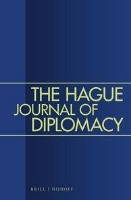
Hague Journal of Diplomacy
Shaping the future of diplomatic scholarship.The Hague Journal of Diplomacy, published by BRILL, is a leading scholarly journal that has significantly contributed to the fields of Political Science and International Relations since its inception in 2007. With an ISSN of 1871-1901 and E-ISSN 1871-191X, this journal has rapidly established itself as a Q2-ranked publication in its category, currently positioned at rank #150 out of 706 in Scopus, placing it in the 78th percentile. This places The Hague Journal as a critical resource for researchers, practitioners, and students interested in contemporary diplomatic practices, international negotiations, and global governance dynamics. As it continues to publish innovative and thought-provoking articles leading up to 2024, this journal not only fosters academic discourse but also serves as a vital platform for disseminating research findings and best practices in diplomacy. While the journal does not operate under an open-access model, its impact on the scholarly community and its role in advancing understanding in diplomacy cannot be overstated. The journal is based in the Netherlands, with its address at PLANTIJNSTRAAT 2, P O BOX 9000, 2300 PA LEIDEN, NETHERLANDS.
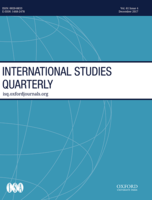
INTERNATIONAL STUDIES QUARTERLY
Illuminating the Complexities of Global ChallengesINTERNATIONAL STUDIES QUARTERLY, published by OXFORD UNIVERSITY PRESS, is a premier scholarly journal in the domains of Political Science and International Relations. With an esteemed Q1 ranking in both fields as of 2023, this journal stands out as a significant contributor to the academic discourse on global issues, diplomacy, and the socio-political challenges facing international systems. Covering a spectrum of interdisciplinary research since its inception in 1978, it provides a vital platform for researchers, practitioners, and students alike to engage with contemporary theoretical frameworks and empirical studies. Although it operates under a traditional subscription model, its high visibility in the academic community ensures that it reaches a wide audience. With a Scopus ranking that positions it in the top percentile of its fields, INTERNATIONAL STUDIES QUARTERLY remains essential for anyone seeking to deepen their understanding of the complexities of international relations.
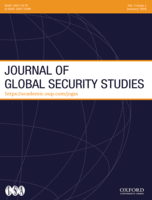
Journal of Global Security Studies
Exploring critical issues in international security.The Journal of Global Security Studies, published by Oxford University Press, is a premier scholarly journal dedicated to advancing the field of political science and international relations, with a particular emphasis on global safety research. Established in 2016, this journal has rapidly made its mark, attaining a distinguished Q1 ranking in both Political Science and International Relations as well as Safety Research categories in 2023, reflecting its high impact and contribution to the discourse surrounding global security issues. Boasting a strong standing in Scopus, ranked #133 out of 706 in Political Science and #36 out of 109 in Safety Research, it serves as a vital platform for scholars, practitioners, and students eager to explore emerging trends and pivotal studies in security matters. Although not open access, the journal ensures that rigorous peer-reviewed research is made available to a wide audience. The Journal of Global Security Studies continues to foster critical dialogue and research, making it an essential resource for anyone interested in the complex landscape of global security.

African Journal on Conflict Resolution
Empowering Voices: Transforming Conflict into Constructive DialogueAfrican Journal on Conflict Resolution, published by the AFRICAN CENTRE FOR CONSTRUCTIVE RESOLUTION OF DISPUTES (ACCORD), serves as a pivotal platform for interdisciplinary research focusing on conflict resolution dynamics across the African continent. With its ISSN 1562-6997 and E-ISSN 2309-737X, this journal aims to foster innovative discussions and knowledge exchange related to peacebuilding, mediation, and conflict prevention. Aimed at researchers, practitioners, and policymakers, the journal is committed to addressing contemporary issues surrounding conflicts within a diverse and evolving African landscape. Though an open-access option is not currently available, the journal's contributions to the field of conflict studies and resolution remain crucial, illustrated through rigorous peer-reviewed articles that enrich academic and practical understanding. The significance of this journal in promoting effective conflict resolution strategies makes it an invaluable resource for those engaged in the pursuit of peace and stability in Africa.

TOPOI-AN INTERNATIONAL REVIEW OF PHILOSOPHY
Elevating interdisciplinary dialogue in philosophy.TOPOI-AN INTERNATIONAL REVIEW OF PHILOSOPHY is a prestigious journal published by Springer, dedicated to advancing the field of philosophy through rigorous scholarly discourse. With an ISSN of 0167-7411 and E-ISSN 1572-8749, this esteemed publication has made its mark in the academic world since its inception in 1982, with significant contributions continuing through to 2024. Recognized in the top tier of its category, TOPOI holds a remarkable Q1 ranking in Philosophy for 2023, placing it in the top 7% of journals within its field as per Scopus rankings. The journal aims to explore a diverse range of philosophical themes and promote interdisciplinary dialogue, making it an essential resource for researchers, educators, and students alike. Located in the Netherlands at Van Godewijckstraat 30, 3311 GZ Dordrecht, TOPOI firmly establishes itself as a global platform for innovative philosophical thought without open access constraints, ensuring high-quality peer-reviewed content for a discerning audience.

MGIMO Review of International Relations
Connecting Scholars, Bridging Disciplines.MGIMO Review of International Relations is a leading academic journal published by MGIMO UNIV PRESS, based in the Russian Federation. This open access journal, which has been accessible since 2012, serves as a crucial platform for the dissemination of scholarly research within the fields of international relations, political science, sociology, and history. With an impact factor that reflects its growing relevance — particularly in Q1 for History and ranked among the top tiers in related disciplines — the journal plays a significant role in advancing the understanding of complex global issues. Its wide-ranging scope encompasses critical analyses and interdisciplinary studies that appeal to researchers, professionals, and students alike. The journal’s Scopus rankings highlight its international standing, notably its 68th percentile in Arts and Humanities, underscoring its contribution to the knowledge of contemporary global relations. As it converges through the years 2019 to 2024, MGIMO Review of International Relations continues to cultivate an intellectual community that fosters impactful dialogue on international dynamics.
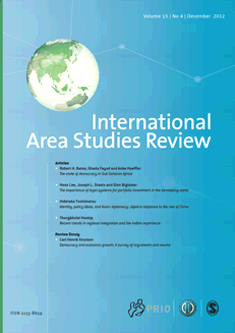
International Area Studies Review
Fostering Insightful Discussions on Global ChallengesInternational Area Studies Review is a pivotal journal in the fields of Political Science, International Relations, and Sociology, published by SAGE Publications Ltd. With an ISSN of 2233-8659 and an E-ISSN of 2049-1123, this journal serves as a distinguished platform for scholarly discourse, exploring the complexities of international affairs and area studies since its inception in 1997. Housing contributions that bridge theoretical perspectives and empirical research, it plays a critical role in advancing knowledge and understanding within its domain. Currently ranked in the Q3 category for both Political Science and Sociology, the journal demonstrates consistent scholarly engagement, reflected in its Scopus rankings, with a notable position in the 55th percentile for Political Science and International Relations. While not open access, the International Area Studies Review remains a vital resource for researchers, professionals, and students eager to contribute to and engage with emerging areas of inquiry in a rapidly evolving global landscape.
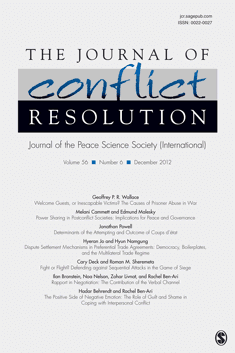
JOURNAL OF CONFLICT RESOLUTION
Illuminating pathways to effective conflict solutions.JOURNAL OF CONFLICT RESOLUTION, published by SAGE PUBLICATIONS INC, is a premier academic journal that has been instrumental in advancing the understanding of conflict dynamics since its inception in 1957. With a notable Q1 ranking in the fields of Business, Management and Accounting, Political Science and International Relations, and Sociology, this journal stands out as an essential resource for researchers, practitioners, and students alike, fostering a deeper exploration into the intricacies of conflicts and their resolutions. The journal is indexed under ISSN 0022-0027 and has an E-ISSN of 1552-8766. Continually updated with cutting-edge research, it boasts impressive Scopus rankings, holding the 53rd position out of 706 in Political Science and International Relations and 169th out of 1466 in Sociology and Political Science. The JOURNAL OF CONFLICT RESOLUTION is vital for anyone engaged in the study of conflict management and resolution strategies, offering pivotal insights and evidentiary support to drive forward debate and policy-making in this ever-evolving field.
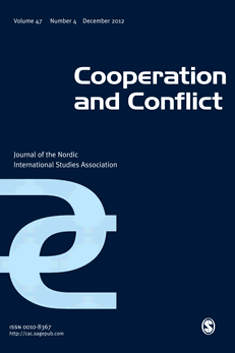
Cooperation and Conflict
Illuminating Pathways in Political Science and DevelopmentCooperation and Conflict is a premier academic journal published by SAGE Publications Ltd that serves as a vital platform for research in the fields of development, political science, international relations, and social sciences. With an impressive impact factor and a prestigious Q1 ranking in multiple categories including Political Science and Development, this journal stands out for its rigorous peer-reviewed articles that explore the complexities of conflict and cooperation in various global contexts. Since its inception in 1965, the journal has remained dedicated to advancing scholarly discussion and providing insights into social dynamics, making it an essential resource for researchers, professionals, and students alike. Although it does not offer open access, its significant contributions to the field and high citation rates underscore its importance in understanding and addressing contemporary societal challenges. For those keen to delve into critical discussions and findings that shape our understanding of cooperation and conflict, this journal is an indispensable asset.